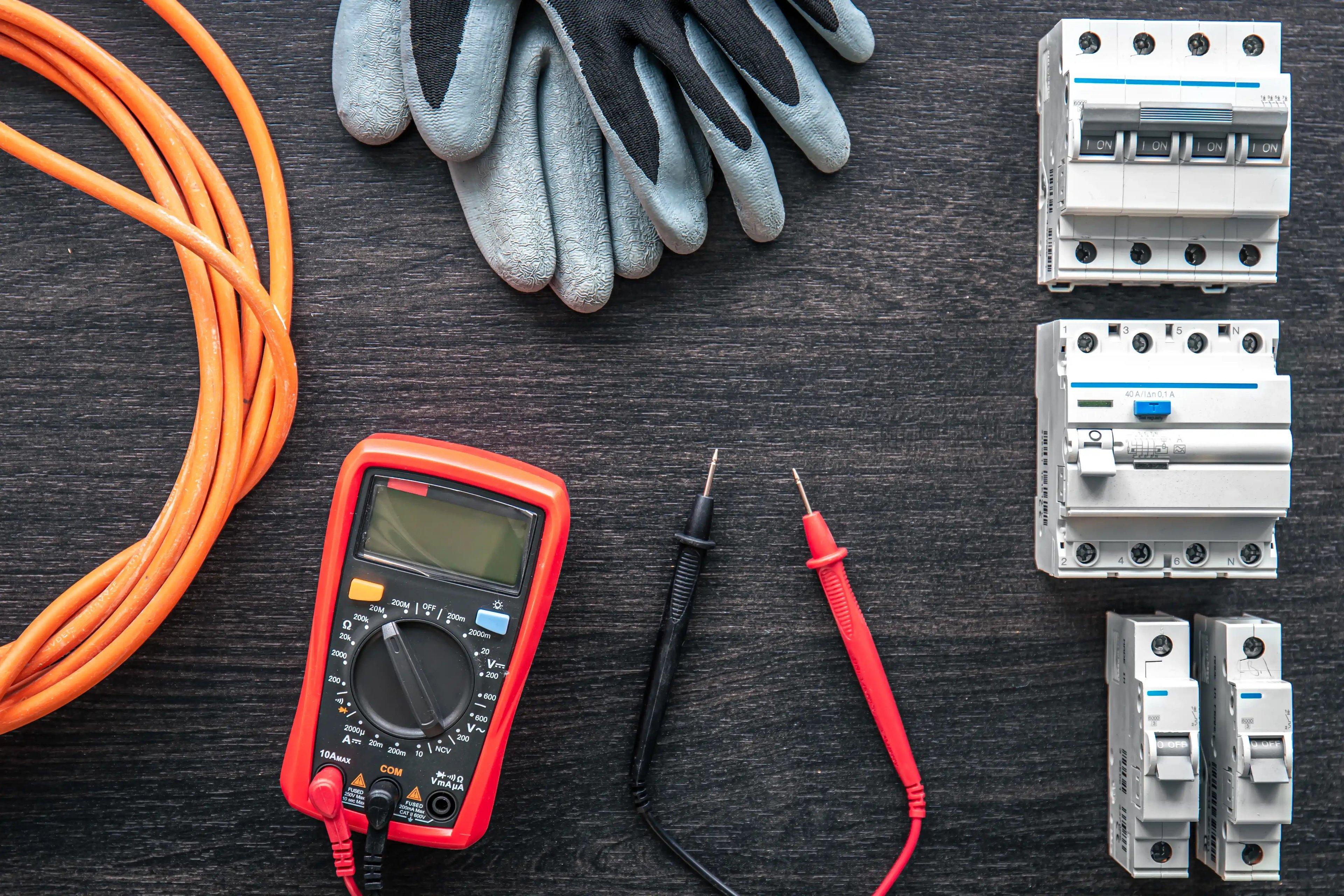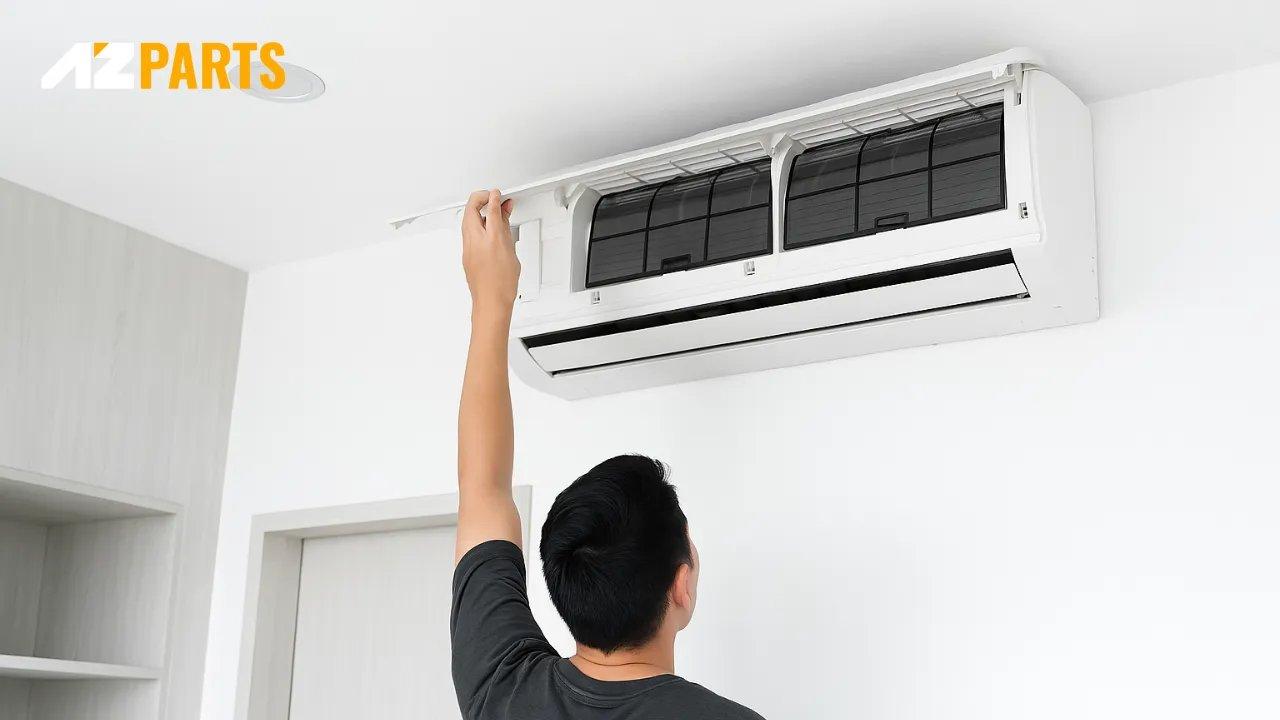How-To Guides
How to Test an AC Capacitor with Multimeter in 9 Steps
AZparts Team
Updated on July 11, 2025
7 min read
When your AC system stops cooling efficiently, one likely culprit is a faulty capacitor. Knowing how to test an AC capacitor with a multimeter can help you spot issues early and avoid costly breakdowns. In this step-by-step guide, AZParts walks you through the process of safely checking your capacitor at home, highlights warning signs to watch for, and shares expert tips on DIY testing risks.

1. Warning Signs of a Faulty AC Capacitor
If your air conditioner isn’t performing properly, a faulty capacitor could be the cause. Here are some clear warning signs that indicate your AC capacitor may need attention:
1.1. Air Conditioner Not Blowing Cold Air
If your air conditioner is on but not blowing cold air, it can be a sign a faulty capacitor may be the cause. The capacitor helps start the compressor, which is essential for cooling. When it fails, the compressor can’t run, so the AC can't remove heat from your home. As a result, the blower fan just pushes warm air through your vents, making the space feel uncomfortable despite the system being on.
AC does not blow cold air (Source: AZParts)
1.2. Humming Noise from Outdoor Unit
A constant humming sound from the outdoor unit may signal a faulty capacitor. When the capacitor is worn out, it struggles to power the compressor, causing it to hum as it tries to start. If restarting the AC doesn’t stop the noise, the capacitor is likely the issue and should be inspected or replaced.
1.3. Rising Energy Bills
If you notice your electricity bills increasing without a clear reason, a faulty AC capacitor could be to blame. A damaged capacitor forces the compressor to work harder and draw more power, making the entire system less efficient. This extra strain not only raises energy costs but can also lead to further wear on other AC components.
1.4. Air Conditioner Turns Off Randomly
If your air conditioner shuts off on its own without warning, a failing capacitor might be the cause. This component helps keep your system running smoothly, and when it's weak or damaged, it can cause random shutdowns. While the occasional short circuit might happen, frequent or unpredictable power-offs signal a deeper issue that should be inspected by a professional.
Air conditioner turns off randomly (Source: AZParts)
1.5. Air Conditioner Does Not Turn On
When your air conditioner doesn't start at all, a faulty capacitor could be the root cause. This component stores the energy needed to start the compressor and fan motors. If it's weak or dead, the system may fail to power on completely. In such cases, it's best to have a technician inspect and replace the capacitor to restore normal function.
1.6. Burning Smell From Outdoor Unit
A burning smell coming from your outdoor AC unit is a serious warning sign, often linked to a failing capacitor. When the capacitor is damaged, it can cause the motor to overheat or the system to draw excess current, creating a burning odor. This may result from worn bearings, debris, or electrical overload. If you notice this smell, turn off the unit immediately and schedule a professional inspection.
A failing capacitor causes burning smell (Source: AZParts)
2. A Complete Guide for Testing Capacitor with a Digital Multimeter
If you suspect your AC capacitor is failing, you can confirm the issue with a simple multimeter test. Follow these steps to safely check your air conditioner capacitor at home:
2.1. Step 1: Power Off
You should turn off the air conditioner at the thermostat and shut off the circuit breaker to cut all power to the unit. This step is crucial for your safety.
Power off before testing capacitor (Source: Freepik)
2.2. Step 2: Locate the Capacitor
You need to open the outdoor condenser’s access panel and find the capacitor, which usually looks like a small metal cylinder connected to wires.
2.3. Step 3: Check the Capacitor's Condition
Before testing, you should look for signs of damage such as bulging ends, cracks, corrosion, or oil leaks. These are clear signs the capacitor needs replacing, even without a multimeter reading.
2.4. Step 4: Discharge Capacitor
To avoid electric shock, you must discharge the capacitor’s stored energy by using an insulated screwdriver to short both terminals together while wearing rubber gloves for safety.
2.5. Step 5: Setup Multimeter
Then, you should set your digital multimeter to the capacitance measurement mode (often marked with a “CAP” symbol) and check that the probes are clean and properly attached.
Setting up multimeter (Source: Freepik)
2.6. Step 6: Remove Capacitor
Next, you need to disconnect the wires from the capacitor’s terminals one by one and, if needed, you should unscrew the bracket to take the capacitor out for easier testing and take a photo of the wire setup to help reconnect later.
2.7. Step 7: Test the Capacitor
Now, you should touch one probe to each terminal of the capacitor and hold them steadily until the multimeter displays a reading, and make sure your hands are dry and steady.
Test the capacitor with dry hands (Source: Freepik)
2.8. Step 8: Read Results
Finally, you must compare the measured capacitance value with the rated capacitance printed on the capacitor’s label; if the reading is significantly lower, it’s time to replace the capacitor.
3. Risks of DIY Testing an AC Capacitor
Although testing a capacitor at home can save time and money, you should be aware of these potential risks before attempting it yourself:
- Electric Shock: Even after turning off the power, a capacitor can hold a dangerous electrical charge that may cause serious injury if not discharged properly.
- Equipment Damage: Incorrect handling or testing can damage not only the capacitor but also other sensitive parts of your AC unit.
- Inaccurate Diagnosis: Without proper tools and experience, you might misread the multimeter results, leading to unnecessary part replacements or missed issues.
- Fire Hazard: Mishandling a capacitor or causing a short circuit can potentially create sparks, overheating, or even a small fire.
- Voiding Warranty: DIY repairs or improper testing may void the manufacturer’s warranty on your AC system.
If you are unsure or uncomfortable doing this yourself, always consider calling a licensed HVAC professional for a safer inspection and repair.
4. What to Expect from a Faulty Capacitor?
When an AC capacitor goes bad, it can cause multiple issues that gradually wear down your air conditioning system and make your home less comfortable. Here are the most common signs and what they mean for your unit:
- Slow or Failed Startup: The air conditioner may take extra time to turn on, or sometimes fail to start altogether. This happens because the capacitor can’t deliver the quick burst of energy the compressor and fan need.
- Weak or Uneven Cooling: Even if your AC runs, it may blow warm air or fail to maintain a steady cool temperature throughout your home.
- Frequent Short Cycling: A faulty capacitor can make your AC turn on and off more frequently than normal, putting stress on other parts of the system.
- Unusual Noises: Buzzing, humming, or clicking sounds from the outdoor unit often mean the capacitor is struggling to power the motor properly.
- Higher Utility Bills: As the system works harder to compensate for the weak capacitor, it uses more electricity, which drives up your monthly energy costs.
- Potential System Damage: If ignored too long, a bad capacitor can cause damage to the compressor or fan motor, leading to more expensive repairs.
To avoid bigger problems, it’s smart to replace a failing capacitor promptly. Using a reliable AC capacitor replacement from AZParts ensures your air conditioner runs safely and efficiently for years to come.
Faulty AC capacitor can cause unusual noises (Source: AZParts)
Testing your AC capacitor with a multimeter helps you catch problems early and avoid expensive breakdowns. Along with replacing a worn capacitor, it’s wise to keep an eye on other key parts like the piercing valve and port adapter to maintain reliable cooling. Routine maintenance and timely part replacement can extend your system’s life and save you money in the long run.
Need trustworthy AC replacement parts? Explore AZParts today for high-quality capacitors and other essential components to keep your air conditioner performing at its best, season after season.
Contact Information:
- Address: 8 The Green, Ste A, Dover, Delaware 19901-3618, United States
- Email: support@azparts.com
Air conditioner
Further Reading
Further Reading





